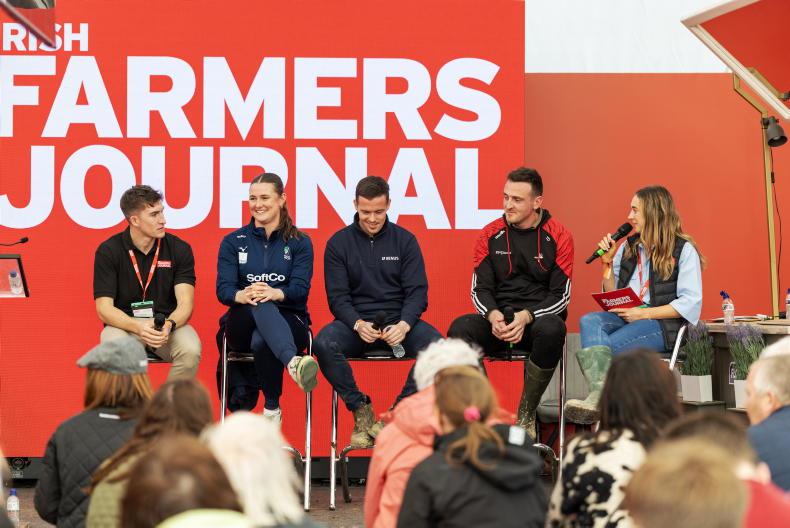The life of a professional tour golfer can be a great one.
In that sentence, the word ‘can’ is the operative one. There are those living out the dream scenario, sitting in the top 50 or so of the world rankings, challenging at majors and contending for Ryder Cup places. Then, there are the rest, vying to get near such rarefied air.
Two years ago, John Murphy’s graph was pointing upwards, having come through qualifying school to earn his DP World Tour card. Unfortunately, since then, form has been hard to find and, in such a Darwinian landscape, the world ranking drops while the prize money dwindles.
For players struggling to make cuts, it’s easy to slip into an unwanted routine of golf courses, airports and more time at home than is the absolute optimum.
Kinsale native Murphy admits that frustration has crept in but, importantly, he has not let it overwhelm him.
“There’s been a lot of really tough days,” he says, “a lot of days filled with doubt and anguish and uncertainty with regard to what direction I was heading and what it was I was trying to achieve and work on.
“I don’t think there was enough structure in place, I don’t think I had enough clarity on what I wanted to do in my game to get to where I want to be. I think, certainly, I’m trying to shift that mindset to make sure I’m confident in what I’m working on – to put it in simpler terms, there were a lot of times when I’d rock up to a practise session and hope I found something to make myself better, as opposed to having clarity about what I needed to do in that session to get better.”
Confidence
If you were of an opportunistic mind, you could fill a load of bottles with a colourful gas or liquid, put labels saying ‘confidence’ on them and stand outside the players’ entrance to a golf tournament. Some level of interest would almost be guaranteed.
And yet, at the same time, Murphy is careful not to park all of his travails under the mental-game category.
“The mental side of the game is obviously very important,” he says, “but it works very differently for everybody.
“I certainly think I’ve made a few mistakes there, where I thought there might have been things I needed to work on mentally when the mental errors were stemming from lack of technical trust, I think.
“I think that’s the synopsis I’ve come to – a quote I heard recently, and that I got a bit of a kick out of, was that the clubface doesn’t know how you’re feeling. If I can just remind myself of that – obviously, nerves are normal, stress is normal when you’re playing a high level of competitive golf, so I think to understand that everybody has those feelings is very important.”
The problem with having mechanical issues is that there is no shortage of quick-fix offers.
“A hundred percent,” he says. “I’ve definitely fallen foul to that, when I have been struggling, just taking advice from all angles. Then you end up trying something different every day but not making any constructive progress.
Golf can change your life so much. I’ve learned that the hard way but I also know that it can work the other way
“Just having a lot more structure and clarity in my golf and in my life going forward is something that’s going to be very important.”
The fact that he mentions his life is indicative of how he sees golf as a big part of it but not an all-consuming one.
In 2020, Murphy won the Byron Nelson Award – one of the top prizes in college golf, it takes into account how a player is in the classroom and their community as well as on the course.
Despite still being so young – he was 26 in June – Murphy has always had a maturity that ensured he saw the bigger picture.
“I’ve now learned that it’s a lot easier to say that when you’re playing really well,” he says.
“It’s something that, thankfully, I’m good at doing. I’m good at separating, if I’m going out with my family or friends, I’ll never bring with me the mood that I have on the course.
“Don’t get me wrong – there are times where it will be chewing me up inside or I’ll be thinking about my swing or whatever when I’m off the course, but making sure that I’m not bringing it home to my life outside of golf is very important to me.”
Having time on his side allows him to be patient rather than anxious. And, whether he plays most of his golf in 2025 on the Asian Tour or European Challenge Tour – or hits a hot streak and goes higher than that – the belief remains strong.
“Golf is probably unique compared to most other sports in that you can hit your prime at any age,” he says.
“I don’t necessarily feel like I’m under a lot of pressure time-wise – there are a lot of people that have got on to the European Tour this year for the first time that are 32 years of age and I feel like I’ve already banked that experience.
“I’ve had friends who’ve had no status on any tour in the world and then, within a month, they’re playing in the Race to Dubai Championship because they get an invite to an event and they win.
“Golf can change your life so much. I’ve learned that the hard way but I also know that it can work the other way.
“I have a fair understanding of what it looks like to be a world-class golfer and to have a lot of that experience under my belt by the age of 26 is a positive. I suppose I can take one thing out of the last few years, I’ve seen a lot of what to do – and what not to do, more importantly!
“I’m certainly grateful that I’ve had these opportunities to expose myself to world-class platforms in the early stages of my career.”









SHARING OPTIONS